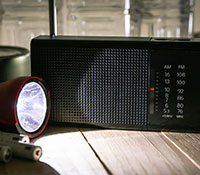Topic: Disaster Relief and Recovery
Posted on 8/21/2023

Emergency experts recommend families keep a battery-operated radio as part of their emergency kits, because during disaster, broadcastingís efficiency and resilience makes it a vital communications resource. "Radio has been the only lifeline and line of communication to the people of West Maui. For days there has been no power, no water, and no Internet service," Chuck Bergson, president and CEO, Pacific Media Group, told Radio Ink.
"It was frustrating in the early stages of the crisis because the local government officials did not fully understand the capabilities and importance of radio," he continued. "In the beginning, they were directing people to a website but that was useless because no one had internet."
"We hear their crying, their tears, their desperate pleas," Brandee Carvalho, host at Mauiís KISS radio, told Hawaii News Now. "It is real. Itís very real for me."
These radio stations came together to broadcast daily updates from local government as well as information on emergency supplies and evacuation shelters.
Read more stories on Disaster Relief and Recovery »
More than 2.46 million American jobs depend on broadcasting. The local broadcast television and radio industry and the businesses that depend on it generate $1.19 trillion annually for the nation's economy.